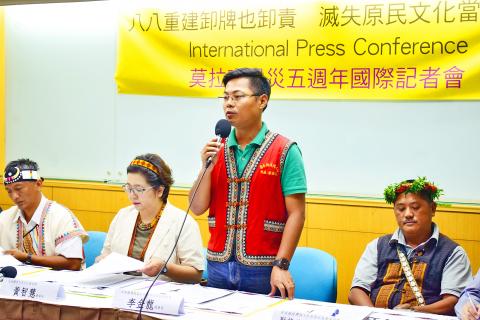As the government celebrates what it termed the “successful reconstruction” of areas devastated by Typhoon Morakot in 2009 and launched an exhibition highlighting reconstruction results, Morakot survivors yesterday accused the government of lying, saying that reconstruction is far from complete.
Morakot is considered the worst storm to hit the nation in 50 years; its massive mudslides caused almost 700 deaths, permanently changed the landscape and forced thousands of people to relocate.
Siaolin Village (小林) in what is now Jiasian Township (甲仙), Greater Kaohsiung, was completed buried by mudslides.

Photo: Courtesy of the Taiwan Association for Human Rights
While the government celebrates what it called the completion of reconstruction five years after the disaster, many survivors disagreed.
“When reconstruction efforts started, the government promised that people would not be relocated too far from where they originally lived, but it is a lie,” Huang Chih-huei (黃智慧), director of Millet Foundation of Indigenous Peoples, told a news conference in Taipei. “The government relocated Rukai residents of Ali Village (阿里) to a different township, forcing them to spend NT$500 per day on gas to drive to and from work on fields in their original village,” Huang said. “It is impossible for these villagers to farm as they used to.”
“In addition, each household has been moved to a house of 16 ping [52.8m2], where it is very difficult for a big family to live,” he said.
Lee Jin-long (李金龍), director of the Industrial Development Association for the Rukai Village of Kocapognan, agreed.
“Ali Village residents were evicted and relocated without their consent, despite the original village not being too seriously damaged,” Lee said. “Besides, the government never asked for their opinions before building the new village, making it a place with no connection to Rukai culture and tradition.”
Lee said that although they have houses, their lives have not been rebuilt, since their farmlands are far away.
Isnankan Dahay, a resident of the Bunun Aboriginal Village of Nansalu (南沙魯) in Namasiya District (那瑪夏), Kaohsiung, said that at the time, the government promised to allocate farmland to each household, “but it never happened.”
With no source of income, many villagers — himself included — moved back to the original village where they have farms, he said.
“The government said that Nanshalu wouldn’t be suitable for residents for at least 50 years,” Dahay said. “Well, I’ve been back for five years now and everything is fine.”
Taiwan Association for Human Rights Secretary-General Tsai Chi-hsun (蔡季勳) said that many people — especially Aborigines forced to relocate — are still struggling to rebuild their lives, but the government is not helping, but rather is creating obstacles for them.
“This is why we’ve always stressed the importance of information transparency and public participation in decisions,” Tsai said. “Otherwise, anyone could be forced to relocate or give up their lifestyle due to government decisions.”

CHAOS: Iranians took to the streets playing celebratory music after reports of Khamenei’s death on Saturday, while mourners also gathered in Tehran yesterday Iranian Supreme Leader Ayatollah Ali Khamenei was killed in a major attack on Iran launched by Israel and the US, throwing the future of the Islamic republic into doubt and raising the risk of regional instability. Iranian state television and the state-run IRNA news agency announced the 86-year-old’s death early yesterday. US President Donald Trump said it gave Iranians their “greatest chance” to “take back” their country. The announcements came after a joint US and Israeli aerial bombardment that targeted Iranian military and governmental sites. Trump said the “heavy and pinpoint bombing” would continue through the week or as long

TRUST: The KMT said it respected the US’ timing and considerations, and hoped it would continue to honor its commitments to helping Taiwan bolster its defenses and deterrence US President Donald Trump is delaying a multibillion-dollar arms sale to Taiwan to ensure his visit to Beijing is successful, a New York Times report said. The weapons sales package has stalled in the US Department of State, the report said, citing US officials it did not identify. The White House has told agencies not to push forward ahead of Trump’s meeting with Chinese President Xi Jinping (習近平), it said. The two last month held a phone call to discuss trade and geopolitical flashpoints ahead of the summit. Xi raised the Taiwan issue and urged the US to handle arms sales to

BIG SPENDERS: Foreign investors bought the most Taiwan equities since 2005, signaling confidence that an AI boom would continue to benefit chipmakers Taiwan Semiconductor Manufacturing Co’s (TSMC, 台積電) market capitalization swelled to US$2 trillion for the first time following a 4.25 percent rally in its American depositary receipts (ADR) overnight, putting the world’s biggest contract chipmaker sixth on the list of the world’s biggest companies by market capitalization, just behind Amazon.com Inc. The site CompaniesMarketcap.com ranked TSMC ahead of Saudi Aramco and Meta Platforms Inc. The Taiwanese company’s ADRs on Tuesday surged to US$385.75 on the New York Stock Exchange, as strong demand for artificial intelligence (AI) applications led to chip supply constraints and boost revenue growth to record-breaking levels. Each TSMC ADR represents

State-run CPC Corp, Taiwan (CPC, 台灣中油) yesterday said that it had confirmed on Saturday night with its liquefied natural gas (LNG) and crude oil suppliers that shipments are proceeding as scheduled and that domestic supplies remain unaffected. The CPC yesterday announced the gasoline and diesel prices will rise by NT$0.2 and NT$0.4 per liter, respectively, starting Monday, citing Middle East tensions and blizzards in the eastern United States. CPC also iterated it has been reducing the proportion of crude oil imports from the Middle East and diversifying its supply sources in the past few years in response to geopolitical risks, expanding